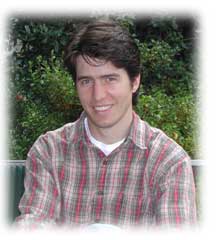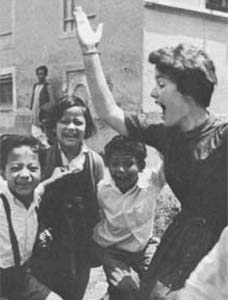
Ivory Coast RPCV Austin Merrill reviews books on imperialism's African legacy
The horror: imperialism's African legacy
Reviewed by Austin Merrill
Sunday, May 8, 2005
The Dirty War in Kenya and the End of Empire
By David Anderson
NORTON; 406 PAGES; $25.95
Imperial Reckoning
The Untold Story of Britain's Gulag in Kenya
By Caroline Elkins
HENRY HOLT; 475 PAGES; $27.50
In an essay he wrote in 1942, George Orwell referred to fellow countryman and author Rudyard Kipling as "a jingo imperialist ... morally insensitive and aesthetically disgusting." But that, Orwell wrote, was beside the point. By World War II "every enlightened person" for several generations had despised Kipling, he said. Nonetheless it was Kipling's writing and its underpinning philosophy -- imperialistic and racist though it may have been -- that had endured, Orwell noted, not the barbed musings of his many detractors from the "pansy-left circles" of the day.
Kipling had been dead six years when Orwell wrote of him, and it had been many more years than that since his literary peak. He'd won the Nobel Prize for literature in 1907, at the age of 41, and produced little of note after that. But the passing of time had not dimmed his visionary power. Kipling had foreseen well before 1914 that Germany would pull Europe into war. Then he foresaw it again before his death in 1936.
But perhaps it is his 1899 poem "The White Man's Burden" that shows Kipling at his most disturbingly prophetic. A work of such rare and wide- ranging impact that it coined a phrase that helped shape the fate of untold millions, the poem calls for "savage wars of peace" to civilize the world's "sullen peoples, Half devil and half child." Though written at the height of the British Empire, the poem was a plea to the United States to flex its imperialistic muscle overseas. Not doing so, the logic went, would leave the door open for other, more barbaric forces to take control.
America's hegemonic rise notwithstanding, Britain would maintain its global reach well into the 20th century. Publicly, Britain's colonial mission remained steadfast and Kiplingesque -- to enlighten the unenlightened. Privately, and usually far from the prying eyes of anyone willing to take them to task, the British could be nothing short of savage.
Two recent books finally do some of that prying, and unveil that savagery of Britain's waning years of governance in Kenya in the 1950s and early 1960s. "Histories of the Hanged: The Dirty War in Kenya and the End of Empire," by David Anderson, and "Imperial Reckoning: The Untold Story of Britain's Gulag in Kenya," by Caroline Elkins, are shocking, stomach-churning works of history. Together they tell the story of the devastation wrought by the British colonial machine on the Kikuyu people of Kenya, evidence of just how desperate Britain was to stave off the crumbling of its empire.
Anderson and Elkins sifted through long-forgotten stacks of court records and interviewed hundreds of survivors to reveal the truth of the struggle between the British and the Kenyans who were fighting for independence. From the time Mau Mau, as the Kikuyu rebellion force was called, first came on the scene in the early 1950s, it was depicted as a sinister movement, guilty of unspeakable violence against African and Briton alike. Newspapers and magazines around the world ran stories and photos that attested to Mau Mau brutality, and the term became synonymous with evil.
These two books turn that notion on its head. Anderson and Elkins show that despite the wicked reputation hung on the Mau Mau, far more killing -- much of it done in gruesome fashion -- was carried out by the British and the Kenyans who remained loyal to the British throne. Whereas Mau Mau killed fewer than 100 British citizens and about 1,800 Kenyan loyalists, the British killed at least 20,000 Mau Mau rebels. Elkins believes the numbers are even more lopsided and malevolent, that even Kikuyu who were not affiliated with Mau Mau became targets of the British and that hundreds of thousands of them may have been killed in cold blood. And for every death, there were at least as many rapes and maimings.
All in the name of civilization. Elkins doesn't mince words: "In the face of incontrovertible evidence to the contrary -- for instance, the castration of a Mau Mau suspect -- the British and their loyalist supporters maintained the illusion that their actions were the epitome of civilized behavior. It was as if by insisting loudly enough, and long enough, they could somehow revise the reality of their campaign of terror, dehumanizing torture, and genocide."
With their country's global imperial power withering, and lifestyles of the nobility under attack at home, many Britons discovered that Kenya was one of the last places they could live in the luxury they desired. "Every white man who disembarked from the boat ... became an instant aristocrat," Anderson writes. "They exploited Kenya to attain a quality of life that few could have aspired to elsewhere. The privileges of a landed aristocracy ... could be had by almost anyone with a white skin in Kenya."
And the native peoples of Kenya -- especially the Kikuyu -- were left to suffer. The British evicted them from their land to allow white settlers to build grand plantations. Those who sought work from the settlers were treated as slaves. And when the Mau Mau rebellion prompted the British to declare a state of emergency, the Kikuyu were rounded up, prosecuted in flimsy trials and sent to prison or barbed-wired detention camps.
Locked up and fenced in, the Kikuyu endured horrible torture at the hands of the British, and these books' difficult-to-bear passages describing that torture force you to consider what lasting impact such treatment must have on a society. The African parallels are many, and it is crushing to read of the similarities between Britain's reign in Kenya and, for instance, Belgium's rule in Congo. But it is also impossible to turn these pages without thinking of more recent events, such as American soldiers torturing prisoners in Iraq.
Anderson and Elkins are academics, and in places their books feel overstudied. Their research and meticulous attention to detail are remarkable, but at times their narrative threads fray, and we are left with page after page of gory details and data. But they are to be forgiven their desire to impart so much information. If you have all this damning material before you, how could you not write it all down?
The colonial era may be largely behind us, but Anderson and Elkins make it clear why it is important to continue to examine that time and attempt to learn from it. The British in Kenya believed they "had a duty, a moral obligation, to redeem the 'backward heathens' of the world," Elkins writes. "The British were going to bring light to the Dark Continent . This was cultural imperialism par excellence. This was the 'White Man's Burden.' "
We are left to wonder, when examining our own efforts to bring freedom and democracy to far-flung lands, to what extent Kipling's vision -- and all its terrible consequences -- lives on.
Austin Merrill lived in Africa for four years, first as a Peace Corps volunteer, then as a reporter. He now lives in New York.









